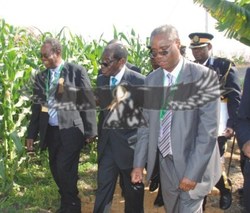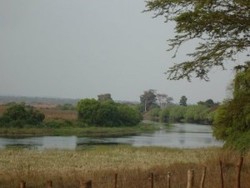
Daily Mail | August 7, 2012
State launches agro investment platform
Six years after launching the Comprehensive Africa Agriculture Development Programme (CAADP) in Zambia, the Ministry of Agriculture and Livestock has taken a giant step by unveiling the process of developing the National Agricultural Investment Plan (NAIP) to mobilise resources from Government, co-operating partners and the private sector for development programmes in the agriculture sector in the country, reports BENEDICT TEMBO.
MINISTER of Agriculture and Livestock Emmanuel Chenda was delighted to see evidence of a strong partnership in the Comprehensive Africa Agriculture Development Programme (CAADP) investment preparation process at Government Complex in Lusaka a week ago.
The attendance of a diversity of representatives from key stakeholders in the agriculture sector was in line with the basic tenets upon which CAADP was developed.
“The launch of the formulation of the National Agricultural Investment Plan (NAIP) within the CAADP framework aims at articulating clear investment programmes for the agriculture sector in Zambia,” Mr Chenda said when launching the process for CAADP investment plan.
He said the event symbolises not only the Ministry of Agriculture’s commitment to enhance agricultural production, but also highlights the desire of the Patriotic Front government to mobilise additional resources for investment in the sector.
CAADP is an African Union (AU) initiative, which is aimed at fostering growth in the agriculture sector on the African continent.
A number of African countries are at different stages in the CAADP process.
For Zambia, CAADP investment formulation is the next major step after signing of the CAADP Country Compact in January 2011.
CAADP deputy co-ordinator Nalishebo Mebeelo said CAADP was endorsed at the Maputo Assembly of the Heads of State and Government.
Dr Mebeelo said the CAADP framework is designed as a potential driver for economic growth and poverty reduction as it encourages annual budgetary allocation of 10 percent to the agriculture sector.
She said the targeted expenditure must enable at least six percent annual sectoral growth in AU member countries.
She said CAADP is aligned to the attainment of the millennium development goals of alleviating hunger and poverty by 2015.
As a tool for platform pooling resources to the agriculture sector, Dr. Mebeelo said CAADP’s objective is to ensure collective responsibility of key stakeholders through broad participation, as well as increase household incomes for the poor and vulnerable in society.
“It is seen as a potential driver for food security and economic development towards the close of the 20th century, it was noted that production and productivity in the agriculture sector was low, investment in the sector by governments, by development partners and private sector was low,” Dr. Mebeelo said.
BACKGROUND
Dr Mebeelo said Zambia was among the first countries in the Common Market for Eastern and Southern Africa (COMESA) region and the continent, to officially launch the CAADP process at Fringilla Lodge in 2006, following the endorsement of the Framework by the Heads of State and Government of the African Union at Maputo in 2003.
COMESA, which has a mandate to coordinate and facilitate CAADP implementation in its 19 member states, has religiously accompanied the Zambian process since its inception – starting with the 2006 official launch.
“This launch marks an important milestone in the CAADP agenda for Zambia, and also in the region for the purposes of achieving both economic growth and poverty reduction,” COMESA secretary general Sindiso Ngwenya said.
Speaking during the launch of the NAIP, Mr Ngwenya congratulated the government for exhibiting such strong political will and determination to advance the CAADP agenda forward and for taking on board key stakeholders from the sector.
“It is my firm belief that through the CAADP agenda, an enabling environment will be created for key players such as the private sector and farmers, to operate freely.
STATUS
To date, 15 out of the 19 COMESA countries have officially launched the CAADP process.
“We expect that Eritrea will join these member states when the country officially launches the CAADP process at the end of next month. In addition, Comoros is expected to officially launch the CAADP process before the end of the year,” Dr. Ngwenya said.
He said 11 out of the 19 member countries have signed the National CAADP Compact; namely Rwanda, Burundi, Ethiopia, Swaziland, Uganda, Kenya, Malawi, Zambia, Seychelles, DR Congo and Djibouti.
He added: “We expect that another two or three countries will sign before the end of the year. Perhaps, what is more interesting is the fact that six COMESA countries have formulated the National Agriculture Investment Plan and these are Rwanda, Kenya, Malawi, Ethiopia, Uganda and Burundi.”
At continental level, 30 countries have signed the Compact, while 24 have finalised their investment plans.
RESOURCES
Mr Ngwenya said once national investment development plans have been finalised, countries need to quickly proceed to mobilise resources for implementation.
“Four of the six COMESA countries with investment plans have received a collective total of US$171.1 million as grant financing from the Global Agriculture and Food Security Programme (GAFSP) to finance bankable programmes contained in the investment plans.
These are Rwanda – for a Hillside Development Programme, Burundi – for irrigation Development Programme, Malawi – to promote irrigated rice and horticulture production as well as crop diversification and value chain development in selected commodities, and Ethiopia.
Dr Mebeelo said the GAFSP was mooted by the L’Aquila G-8 Summit with a collective pledge amounting to US$22 billion to support developing countries that have shown commitment to the agricultural sector.
Dr Mebeelo said one of the criteria for accessing this funding by African countries is that a country should have an investment plan that has been technically reviewed by independent experts.
She said the African Union Commission and the NEPAD Planning and Coordinating Agency have designed the Grow Africa initiative which builds on the public-private partnership models piloted by the World Economic Forum’s New Vision for Agriculture Initiative designed to promote public-private partnerships in the agricultural sector.

African Development Bank (AfDB) country director, Freddie Kwesiga, said as a quality document, it is important that the CAADP investment plan remains focused as an investment component of the Sixth National Development Plan, with clear investment proposals to stimulate agricultural sector growth.
“These should be based on proven models, experiences and lessons from the past in Zambia and elsewhere,” Mr Kwesiga said.
He said the co-operating partners look forward to specific interventions to ensure improved land tenure and equitable access to land by partnerships of small, medium and large-scale investors.
“In this regard, the cooperating partners would welcome the ministry’s invitation to undertake an exploratory visit to Nansanga Farm Block. Beyond the CAADP investment plan, the cooperating partners remain committed to mobilise investment resources required for implementation of priority programmes identified,” he said.
He said the cooperating partners shall align their country support programmes to the CAADP investment plan.
“In this regard, a donor tracking matrix has been compiled to highlight existing and pipeline interventions,” Mr Kwesiga said.
FORUM
Mr Ngwenya said COMESA will organise an agricultural investment forum to enable member states to share their bankable programmes with potential global investors.













